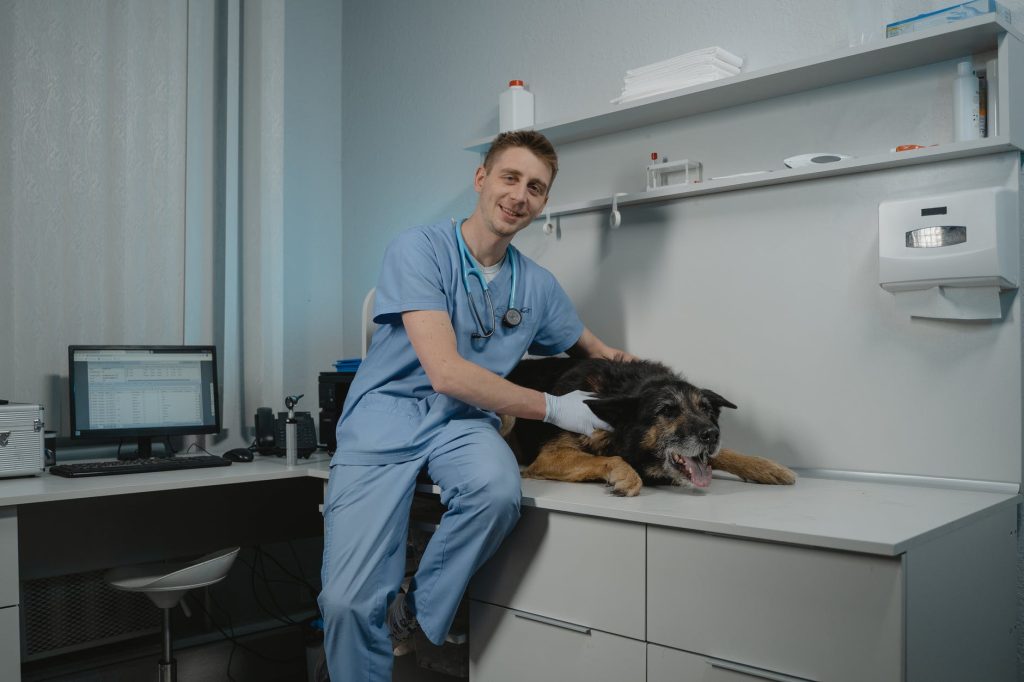
Preventive care is the cornerstone of maintaining your pet’s health and well-being. With effective preventive measures, you can help your furry friend lead a happy and healthy life. This article will cover essential preventive care tips and resources to ensure your pet stays at their best.
Regular Veterinary Check-ups
Annual Exams and Early Detection of Health Issues
One of the most important aspects of preventive care is regular veterinary check-ups. Just like humans, pets need to see their doctor regularly – at least once a year – for a complete examination. Early detection of health issues makes treatment more effective and might save your pet’s life.
Discussing Preventive Care Measures with Your Veterinarian
During your pet’s check-up, your vet will discuss various preventive care measures specific to your pet’s needs. Different pets require different care; for example, senior pets might have other health considerations than young ones. By talking to your vet, you can identify the best course of action to ensure your pet’s long-lasting health and happiness.
Pet Vaccinations
Importance of Vaccinations in Maintaining Pet Health
Vaccinations is vital in preventing severe illnesses in pets. By keeping your pet up-to-date on their vaccinations, you can protect them from life-threatening diseases, some of which have no cure.
Core Vaccines and Additional Vaccines Depending on Lifestyle and Location
There are core vaccines that every pet should receive, while some vaccines may vary depending on your pet’s lifestyle and location. Consult with your veterinarian to determine which vaccines are crucial for your furry companion, considering their specific needs and surroundings.
Parasite Prevention
Flea and Tick Prevention
Parasites such as fleas and ticks are common concerns for pet owners, as they cause skin irritation and allergies and can transmit diseases. Ask your veterinarian about the most effective flea and tick prevention products, like topical treatments or oral medications, to protect your pet.
Heartworm Prevention
Heartworm disease is a severe and potentially fatal condition caused by parasitic worms that live in a pet’s heart and blood vessels. Preventing heartworms is crucial, as treatment can be risky and challenging. Talk to your veterinarian about suitable heartworm preventatives for your pet, such as monthly oral medications or topical treatments.
Internal Parasites and Deworming
Regular deworming is essential to keep your pet free from internal parasites like roundworms, hookworms, and tapeworms. Your vet can recommend an appropriate deworming schedule and products based on factors like your pet’s age, lifestyle, and geographical location.
Nutritious Pet Diet
Importance of a Balanced Diet
A balanced and nutritious diet is vital to maintaining your pet’s overall health. Providing your pet with high-quality food rich in necessary nutrients promotes a healthy coat, maintains strong muscles and bones, and ensures proper digestive function. Discuss with your veterinarian to determine the best diet for your pet, considering their age, breed, weight, and activity level.
Understanding Pet Food Labels and Ingredients
Pet food labels can be confusing, but learning how to read them is essential for identifying the best nutrition for your pet. Pay attention to ingredients, guaranteed analysis, and AAFCO nutritional adequacy statements on the label. If unsure, consult your veterinarian for guidance on choosing the best diet for your furry friend.
Incorporating Supplements if Necessary
Some pets may require additional supplements to maintain optimal health. Work with your veterinarian to determine if your pet needs supplements, such as joint support or omega-3 fatty acids, to enhance their well-being.
Exercise and Maintaining a Healthy Weight
The Role of Exercise in Pet Health
Regular exercise is essential to keep your pet at a healthy weight and promote their overall physical and mental well-being. Engaging in daily physical activities builds muscles, strengthens bones, and prevents obesity, which reduces the risk of many health issues.
Ideal Exercise Routines for Different Types and Breeds of Pets
Different pets require varied exercise routines depending on their age, breed, size, and energy level. For example, a small dog might benefit from multiple short walks daily, while a large breed dog may require longer walks and regular playtime. Consider your pet’s unique needs and preferences when planning their activities.
Monitoring and Controlling Your Pet’s Weight
Monitoring your pet’s weight is essential to ensure they maintain a healthy lifestyle. Regularly evaluate your pet’s body condition and adjust their diet and exercise accordingly. Collaborate with your veterinarian to develop a weight management plan, if necessary.
Dental Care and Hygiene
Importance of Pet Dental Care
Having a proper dental care routine for your pet is crucial for maintaining their oral health and preventing issues like gum disease, tooth loss, and bad breath. Poor dental hygiene can also lead to more severe health problems, making it a core component of preventive care.
Regular Teeth Brushing and Professional Cleanings
Brush your pet’s teeth regularly using pet-specific toothpaste and toothbrushes. Additionally, schedule professional dental cleanings with your veterinarian at least once a year. Regular dental check-ups can detect problems early, preventing more extensive treatments later on.
Pet Dental Health Care
Along with daily teeth brushing and professional cleaning, dental treats and chew toys can significantly contribute to your pet’s oral health. These items help reduce plaque and tartar buildup while keeping your pet entertained. If you want to explore more options for dental care products, you can look here.
Grooming and Hygiene
Regular Grooming for a Healthy Coat and Skin
Regular grooming not only makes your pet look good but also has numerous health benefits. Brushing your pet’s coat distributes natural oils, stimulates circulation, and removes dead hair and debris. This practice also allows you to examine your pet’s skin for any unusual lumps, itchiness, or signs of infection.
Selecting the Right Grooming Tools and Products for Your Pet
Choose grooming tools and products specially designed for your pet’s hair length and breed, such as brushes, combs, shampoos, and conditioners. Grooming products should be pet-safe to avoid irritation and allergic reactions.
Proper Ear, Nail, and Paw Care
Regularly check your pet’s ears for signs of infection or parasites and clean them gently with a pet-specific solution. Keep your pet’s nails trimmed to avoid overgrowth, which can cause discomfort or lead to injury. Inspect your pet’s paws for cuts, irritations, or foreign objects and provide necessary treatment or maintenance if needed.
Mental Stimulation for Pets
Importance of Mental Stimulation to Prevent Boredom and Destructive Behavior
Providing mental stimulation for your pet is crucial in maintaining their emotional well-being. Challenging your pet’s mind helps prevent boredom-related issues like destructive behavior, excessive barking, or digging.
Pet Wellness Exam
During a pet wellness exam, your veterinarian conducts a detailed assessment of your pet’s overall health, including examining their body systems, checking their weight, and assessing dental health. Wellness exams allow for early detection of potential health problems and provide a chance to discuss preventive care measures.
To learn more about pet wellness exams, click for more info.
Puzzle Toys and Interactive Games for Cognitive Health
Provide your pet with engaging puzzle toys, interactive games, or training exercises that encourage problem-solving and cognitive skills. These activities not only keep your pet mentally stimulated but also strengthen the bond between you and your furry companion.
Socialization and Environmental Enrichment
Expose your pet to various people, animals, and environments to create a well-rounded, confident companion. Proper socialization can significantly improve your pet’s mental well-being by reducing anxiety, fear, and aggression. Environmental enrichment includes providing interesting surroundings and stimulation to satisfy your pet’s curiosity and natural instincts.
Spaying and Neutering
Benefits of Spaying and Neutering for Pet Health
Spaying or neutering your pet offers both health and behavioral benefits. For female pets, spaying reduces the risk of mammary cancer and uterine infections. For males, neutering can prevent testicular cancer and prostate issues. Additionally, spaying or neutering helps reduce aggression, marking, and roaming behaviors.
Impact on Pet Behavior and Population Control
Aside from the health benefits, spaying and neutering also contribute to responsible pet ownership and population control. Millions of animals end up in shelters every year due to overpopulation, and many are euthanized. By sterilizing your pet, you can help reduce the number of unwanted animals and save lives.
Deciding the Right Time for Spaying and Well-being
There is no one-size-fits-all approach to determining the ideal time for spaying or neutering your pet. Consult with your veterinarian about the best age, considering your pet’s breed, size, and individual needs.
Safe Pet Environment
Pet-proofing Your Home and Yard for Safety
Creating a safe environment for your pet is crucial to prevent accidental injuries or ingestion of harmful items. Secure your home and yard by eliminating potential hazards, such as toxic plants, chemicals, and small objects that could pose choking risks.
Keeping Dangerous Substances and Objects Out of Reach
Store items like medications, cleaning products, and sharp objects out of your pet’s reach. Ensure countertops and shelves are secure to prevent your pet from accessing or knocking over harmful substances.
Protecting Your Pet from Extreme Temperatures and Weather Conditions
Provide a safe and comfortable environment for your pet during extreme weather conditions. Provide shade, ventilation, and clean water during hot weather, and ensure they have proper shelter and warmth during colder months.
Microchipping
Importance of Microchipping for Pet Safety and Identification
Microchipping your pet is a valuable preventive measure for their safety. A microchip provides an additional means of identification if your pet gets lost or separated from you, increasing the chances of them being returned home.
How Microchipping Works and Its Benefits
A microchip is a tiny electronic device implanted under your pet’s skin. Each microchip contains a unique identification number that can be scanned by a vet or animal shelter, giving them your contact information. Microchips are permanent and reliable, unlike collars and tags, which can be removed or damaged.
Updating and Maintaining Microchip Information
Ensure your microchip registration information is up-to-date, including your contact details and the pet’s name. Regularly ask your vet to check the microchip to make sure it hasn’t migrated from its original position.
Senior Pet Care
Older pets have differing healthcare needs and may require more frequent check-ups to manage age-related issues like arthritis, dental problems, and cognitive decline. Monitor your senior pet’s health closely and consult with your veterinarian about suitable diet and exercise plans as necessary. To learn more about caring for senior pets, click to read more.
Top Resources for Pet Preventive Care
Online Resources and Websites
There are many reliable online resources to learn about pet preventive care. Websites like WebMD Pets, PetMD, and the American Veterinary Medical Association provide extensive information on pet health, wellness tips, and preventive measures.
Books and Magazines on Pet Care
Many books and magazines can guide your journey to providing the best preventive care for your pet. Consult reputable publications like “Your Dog” and “Your Cat” magazines or books such as “The Complete Healthy Dog Handbook” and “The Cat Owner’s Home Veterinary Handbook” for expert advice and care tips.
Local Pet Care Courses and Workshops
Explore the possibility of attending local pet care courses, seminars, or workshops offered by veterinary clinics, animal shelters, or pet organizations. These events provide practical, hands-on knowledge about preventive care and pet health management.
Final Thoughts
Preventive care is paramount in ensuring your pet’s health and happiness. By following the above guidelines and collaborating with your veterinarian, you can give your best friend the care they deserve to live a long, healthy, and fulfilling life. Take proactive steps today, and your pet will thank you in the long run.








